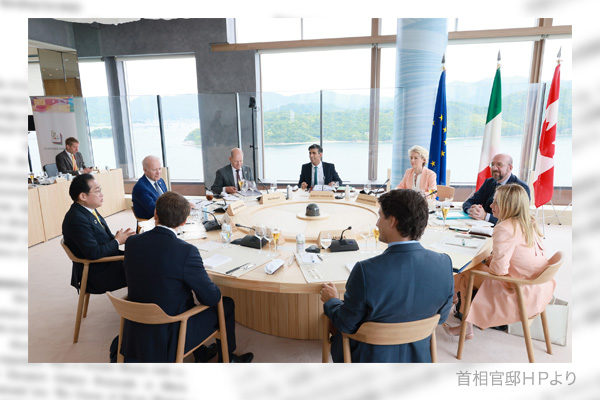Ukrainian President Volodymyr Zelenskyy’s surprise participation in the Group of Seven (G7) Hiroshima summit attracted global attention, overshadowing the summit’s primary theme of how to deal with China. However, what should be noted at the summit are economic security and engagement with the Global South, both of which are focused on China.
If you just follow the wording of the G7 leaders’ communique and rely on governments’ “self-serving” explanations, we may lose sight of key challenges.
Can G7 jointly respond to economic coercion?
The Hiroshima summit emphasized dialogue as a basic stance toward China. It was expected that G7 would pursue “de-risking,” rather than “decoupling,” in dealing with China. Such position had been first expressed earlier this year by Ursula von der Leyen, president of the European Commission or the executive organ of the European Union (EU), and then by U.S. National Security Adviser Jake Sullivan, reflecting the Biden administration’s policy of dialogue with China.
When it comes to specific actions, however, the G7 members’ accord is precarious because they view things differently.
Particularly important for economic security is how to respond to China’s “economic coercion.” The problem is whether the G7 countries can develop their “serious concern” into “joint actions.” Such actions include support for countries subjected to China’s economic coercion and countermeasures to such coercion. Since any of the G7 members alone cannot counter China, their joint actions are required.
The launching of a framework called “Coordination Platform on Economic Coercion” is viewed as an achievement at the G7 Hiroshima summit. While the framework is important, I am concerned about actions the G7 countries can incorporate into the framework.
Japan, though being this year’s G7 chair, is the only G7 member that has no means to counter China. The EU and the United States have their respective measures to counter economic coercion and are preparing countermeasure bills. In contrast, Japan is hesitant even about preparing a countermeasure system. Japan may not want to provoke China. But like counterstrike capabilities for defense, countermeasures to China’s economic coercion are necessary as deterrence.
Countermeasures may be selected from a diverse of options. The Japanese government should promptly develop a system under the leadership of the National Security Secretariat (NSS).
Global South meeting as one of the pillars
Furthermore, an expanded meeting including the Global South has become more important than ever. This is because the G7 countries have lagged behind China in wooing Global South countries. The expanded meeting has been nothing more than an accessory to G7 summits so far, but it may be necessary to institutionalize it as one of the two pillars alongside G7 summits in the future. The Hiroshima summit should be the first step toward the institutionalization.
It is important that Japan has set out “rule of law” instead of the U.S.-advocated “democracy” as a guiding principle. If so, it is a problem that Middle Eastern countries were not included in the invited countries. Since China is actively approaching the Middle East, G7 should hurry up and strengthen relationship with the region.
Also, even if "rule of law" is accepted by the Global South, it does not necessarily attract these countries. What these countries value is practical benefits. Practical benefits such as decarbonization and digitalization projects are effective. That is why Japan should take the lead.
G7, which was reappreciated for strengthened economic sanctions against Russia, faces important challenges of whether it can unite against China and incorporate the Global South.
Masahiko Hosokawa is a professor at Meisei University and a former director-general of the Trade Control Department at Japan’s Ministry of Economy, Trade and Industry. He is also a Planning Committee member at the Japan Institute for National Fundamentals.


